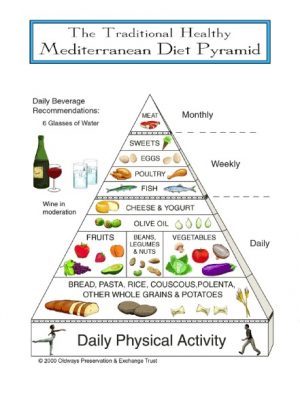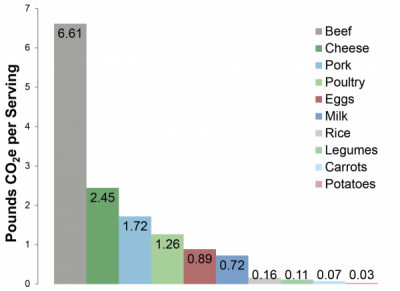 …by Catherine Kessler, Green Team Lead
…by Catherine Kessler, Green Team Lead
I recently listened to Carl Sagan’s “The Pale Blue Dot,” a moving description of our planet written after Voyager 1 looked back at Earth as it left our solar system in 1990. It reminded me of Earth’s fragility and the thin layer of atmosphere that makes our world livable. We now have a little time left to save ourselves from devastation; the changes we have made to reduce greenhouse gas emissions are not keeping pace with the heating up of our atmosphere. www.planetary.org/explore/space-topics/earth/pale-blue-dot.html
So, we all must do more. I am addressing something every person can do, that is actually simple, no added cost, and is significant to a healthy you and a healthy planet.
The world’s food system is responsible for about ¼ of the planet-warming greenhouse gases, C02, methane (“natural gas”) that humans generate each year. That includes raising and harvesting all the plants, animals and animal products we eat, as well as processing, packaging and shipping food to markets all over the world.
Meat and dairy, particularly from cows, have an outsize impact, with livestock accounting for around 14.5 percent of the world’s greenhouse gases each year. That’s roughly the same amount as the emissions from all the cars, trucks, airplanes and ships combined in the world today.
What about all the talk about eating more animal protein and very low carb for good health?
 More recent evidence unequivocally shows that the plant-based diet is the best. When studies are continued for longer periods on large groups, the outcomes show lower blood fats and blood pressure, healthier weight maintenance, healthier gut bacteria which in turn maintain a healthy immune system. (very low animal fat, high fiber, increase of beneficial plant compounds and the omission of harmful compounds produced from charred meat).
More recent evidence unequivocally shows that the plant-based diet is the best. When studies are continued for longer periods on large groups, the outcomes show lower blood fats and blood pressure, healthier weight maintenance, healthier gut bacteria which in turn maintain a healthy immune system. (very low animal fat, high fiber, increase of beneficial plant compounds and the omission of harmful compounds produced from charred meat).
So, what is a Plant-Based Diet?
It means using the main plant proteins (see below) instead of animal proteins, but does not completely eliminate the foods that may be part of special cultural celebrations. And it also has a significant amount of your Calories coming from vegetables, fruits, whole grains, nuts, seeds, and plant oils, to lower risk of diabetes, cardiovascular disease, and cancer.
Try making a gradual shift to mostly plant-based eating:
- Reduce beef portion size (adult needs are met with 3 oz.or 21grams of protein at one time)
- Reduce frequency of beef gradually to monthly; substitute poultry, seafood, plant protein.
- Plan several days of meatless meals by making a large pot of beans, or lentil stew.
For YOUR health, don’t increase intake of fatty pork (even though its carbon footprint is lower than beef and lamb.
Gradually move to making your protein source plant-based: Beans, lentils, hummus, tofu, tempeh, quinoa, nuts, seeds are the highest in protein quantity and quality.
This link provides a guide for decision-making.
Here is a vegetarian guide for selecting foods.
Enjoy increasing health benefits for yourself as you join with others to give our thin layer of atmosphere a long life!
Contact me through the office (510-531-8212, [email protected])








